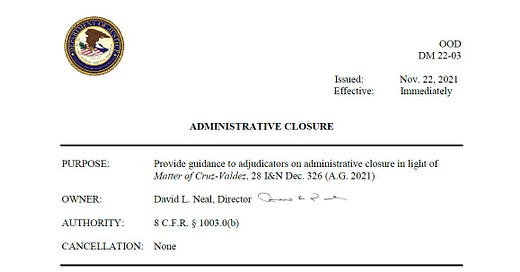Just as many people are watching the clock wind down towards the quintessential American holiday (by which I mean Black Friday, of course, although I suppose Thanksgiving is coming up, too), David Neal, Director of the Executive Office of Immigration Review (EOIR), released a new memo that puts prosecutorial discretion and administrative closure back on the docket.
The memo, which was released yesterday, instructs immigration judges to ask DHS trial attorneys (who act as quasi-prosecutors in immigration court) at the beginning of removal hearings if the non-citizen is a priority for deportation. If DHS says no, the judge is instructed to inquire whether DHS plans to exercise prosecutorial discretion or seek administrative closure.
I’ll explain more about this below, but the short story is, many people currently at risk of deportation in court could experience a sigh of short-term relief.
Immigration attorney Matthew Hoppock, not one for false celebration, called the memo “extremely helpful.”

**Note: This post is not legal advice nor is this a legal practice advisory.**
What is administrative closure?
Administrative closure is a way for immigration judges to take a case off their docket for an indefinite period of time. There are lots of reasons for this. Immigrants may be waiting for Citizenship and Immigration Services to adjudicate a petition of some kind that bears directly on the outcome of a case, and rather than waste court resources on regular status hearings, the judge may simply “admin close” the case (that’s the lingo) until the USCIS is done. Admin closure was also used by the Obama administration to exercise discretion, much like the Biden administration is doing now. Cases can be reopened at any time by the judge or either party (i.e. DHS or the immigrant/immigrant’s counsel).
Trump Administration Attempted to Revoke Admin Closure
I suppose one way to realize how important admin closure has been over the years is to know that the Trump administration tried to obliterate it entirely as a legal option, first in the form of a decision issued by Attorney General Sessions in the Matter of Castro-Tum in 2018, and second in the form of a proposed rule change in August 2020, which met considerable resistance.
In fact, at the time, TRAC published a detailed report to examine the Trump administration’s argument that administrative closure contributed to the growing immigration court backlog. We were genuinely curious about what the data showed, but we could find no such evidence that admin closure added to the backlog, and, in fact, we found that the underlying arguments that the EOIR was using to justify this change were substantially flawed. We also found that admin closure increased substantially under President Reagan and continued well into the Trump administration (until Castro-Tum anyway). See the report here: The Life and Death of Administrative Closure.
Administrative Closure Revived in 2021
Then in July of this year, Supreme Court Justice Merr… no, wait… Attorney General Merrick Garland effectively re-instituted (re-normalized? revived?) admin closure in the Matter of Cruz-Valdez. The memo issued yesterday, therefore, is not what revived administrative closure legally, but it does suggest coming changes to the practice of administrative closure in removal cases.
EOIR Director Neal’s memo comes on the heels of DHS Secretary Mayorkas’ enforcement priorities memo. That memo, released on September 30 and titled Guidelines for the Enforcement of Civil Immigration Law, aims to prioritize immigration enforcement resources. I wrote last week about how Ohio and two other states are now suing the DHS over this memo.
Neal’s memo is titled: “Provide guidance to adjudicators on administrative closure in light of Matter of Cruz-Valdez, 28 I&N Dec. 326 (A.G. 2021).” The memo rehashes some context and justification for prosecutorial discretion and administrative closure, but then arrives at what I think is the most important part near the end:
Where at all possible, issues involving administrative closure should be resolved in advance of individual calendar hearings and not at hearings. Immigration judges are therefore encouraged to send scheduling orders to parties well before the hearing takes place, inquiring of DHS whether the respondent is an immigration enforcement priority, and otherwise soliciting the parties’ positions on administrative closure and other issues related to prosecutorial discretion. Where such issues have not been resolved in advance of an individual calendar hearing, the immigration judge should ask DHS counsel on the record at the beginning of the hearing whether the respondent is an immigration enforcement priority. Where DHS counsel responds that the respondent is not a priority, the immigration judge should further ask whether DHS intends to exercise some form of prosecutorial discretion in the case. As part of this colloquy, the immigration judge should ask whether the parties want the case administratively closed.
In essence, it appears that EOIR Director Neal is directing the judges to actively raise the question of prosecutorial discretion and administrative closure to ICE attorneys based on the understanding that DHS Secretary Mayorkas has told ICE to put the enforcement priorities memo into effect. This is more than just giving judges the option of administrative closure, it appears to be instructing them to raise it as an option. I think that distinction is important.
The Data Will Help Tell the Story
If this plays out as promised, we should see more “nonpriority” cases closed in the comings months and years, while “priority” cases may well move faster towards a conclusion. The question is, what will an analysis of the data show in this regard? Will we see more cases administratively closed? And will this, in fact, reduce the backlog of cases by allowing some cases to be decided faster? As usual, I will be eager to see what the data says in the new year if and when TRAC is able to do a more thorough analysis of at least a few months of data.





Very clearly explained. Thank you Austin.
Here's to more holiday "miracles" like this one and possibly the end of MPP? (We can hope, at least.) Happy Thanksgiving to all!